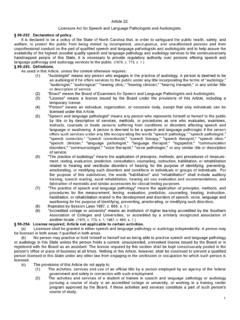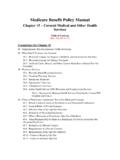Transcription of Occupational Therapy: Effective School-Based Practices ...
1 Occupational therapy : Effective School-Based Practices within a Policy Context Prepared for the Center on Personnel Studies in Special Education Y. by Yvonne Swinth University of Puget Sound Karen C. Spencer Colorado State University Leslie L. Jackson Easter Seals, Inc. June 2007. COPSSE Document No. OP-3. Center on Personnel Studies in Special Education UNIVERSITY OF FLORIDA. Center on Personnel Studies in Special Education University of Florida Johns Hopkins University Vanderbilt University University of Colorado - Boulder Instructional Research Group, Long Beach, CA. COPSSE research is focused on the preparation of special education professionals and its impact on beginning teacher quality and student outcomes.
2 Our research is intended to inform scholars and policymakers about advantages and disadvantages of preparation alternatives and the Effective use of public funds in addressing personnel shortages. In addition to our authors and reviewers, many individuals and organizations have contributed substantially to our efforts, including Drs. Erling Boe of the University of Pennsylvania and Elaine Carlson of WESTAT. We also have benefited greatly from collaboration with the National Clearinghouse for the Professions in Special Education, the Policymakers Partnership, and their parent organizations, the Council for Exceptional Children and the National Association of State Directors of Special Education.
3 The Center on Personnel Studies in Special Education, H325Q000002, is a cooperative agreement between the University of Florida and the Office of Special Education Programs of the U. S. Department of Education. The contents of this document do not necessarily reflect the views or policies of the Department of Education, nor does mention of other organizations imply endorsement by them. Recommended citation: Swinth, Y., Spencer, K. C., Jackson, L. L. (2007). Occupational therapy : Effective School-Based Practices within a policy context. (COPSSE Document Number OP-3). Gainesville, FL: University of Florida, Center on Personnel Studies in Special Education.
4 G. Additional Copies may be obtained from: COPSSE Project Box 117050. University of Florida Gainesville, FL 32611. 352-392-0701. 352-392-2655 (Fax). U. S. Office of Special Education Programs There are no copyright restrictions on this document; however, please credit the source and support of the federal funds when copying all or part of this document. CONTENTS. Introduction 4. Background..5. Occupational ..6. School-Based Occupational therapy ..9. Conclusions..27. REFERENCES .29. TABLES. Table 1. Summary of CEBM Levels of Evidence ..13. Table 2. Databases Used ..14. Table 3. Search Terms ..15. Table 4. Evidence for Occupational therapy in the Schools.
5 16. 3. INTRODUCTION. The Individuals with Disabilities Education Act [IDEA] (2004) and the Individuals with Disabilities Education Improvement Act [IDEIA] (2004) require schools and early intervention programs to use appropriately qualified personnel to provide special education, related services, and early intervention services. These services are designed to help meet the academic, developmental, and functional needs of eligible children with disabilities. In the 2004. reauthorization of IDEA ( 108 446), Congress determined that children's education could be more Effective by supporting high-quality, intensive preservice preparation and professional development for all personnel who work with children with disabilities in order to ensure that such personnel have the skills and knowledge necessary to improve the academic achievement and functional performance of children with disabilities, including the use of scientifically based instructional Practices , to the maximum extent possible.
6 ( 601(c)(5)(E)). Under the auspices of the federally funded Center on Personnel Studies in Special Education [COPSSE], the authors for this report were charged with the task of reviewing the research to identify evidence-based and Effective Practices for School-Based Occupational therapy [OT]. The purpose of this report, therefore, is to provide an overview of current research and evidence that supports OT Practices in schools, specifically children serviced under Part B of IDEA. While Part C is equally important to address, this was not included in the charge for this report. School-Based Occupational therapists, addressing the needs of students in preschool through high school, are the primary audience for this report as are institutions of higher education that prepare Occupational therapists for School-Based practice, school administrators who hire and supervise Occupational therapists, and the students and families who receive special education and related services.
7 4. BACKGROUND. COPSSE examined personnel preparation as well as personnel competency and recruitment in special education. The project's primary focus on special education teachers and administrators was supplemented with a secondary focus on related service personnel in OT, physical therapy , school psychology, speech language pathology/audiology, and school counseling. For each participating discipline, reports were developed to clarify the current status of personnel preparation, recruitment, and retention [For OT, see Swinth, Chandler, Hanft, Jackson, &. Shepherd (2003)]. Following completion of the reports, a research panel of related service experts and researchers was convened to discuss the status of personnel preparation, competency, and personnel recruitment in their respective fields.
8 These experts were charged to develop a comprehensive, interdisciplinary related service research agenda that identified a critical need for scientifically based studies of the related service personnel Practices and the impact on targeted student outcomes (Rapport, 2004). Additionally, a consensus among panel members suggested that related service professionals, in general, lacked needed competencies to use the available research effectively to make everyday decisions regarding service planning and delivery. Acting on the developed research agenda, the present report was prepared to help advance evidence-based OT practice in schools and to facilitate Occupational therapists' accountability for targeted student outcomes, namely, educational participation to support academic achievement and performance within the general curriculum and to include functional life skills as required by IDEA and the No Child Left Behind Act.
9 More specifically, this report describes OT and then begins to identify Effective OT Practices and interventions. 5. Occupational therapy . This first section provides the reader with an understanding of the domain and scope of OT. services in educational settings. A basic understanding of OT therapy services in schools is assumed. OT practice within educational settings enables students with disabilities or those at risk for disability to engage in their everyday school occupations comprised of many overlapping and interrelated activities, including academic, social, extracurricular, and self-care tasks. In collaboration with other members of the education team, Occupational therapists engage in evaluation, intervention, and outcome processes when serving children and youth.
10 OT services always begin with the outcome in mind: What is it that the child and adolescent need or want to do in order to be successful as a student? Student performance of education-related activities based on access to and engagement in schooling represent the targeted outcomes for OT services. Toward this end, Occupational therapists may work to enhance: (1) student performance skills, , motor, process, communication/interaction skills; (2) performance patterns, , needed or important school habits, routines, roles; (3) the student's educational context, , physical, social, cultural, technology; (4) the student-activity match, , space, objects, timing, student function needed; and (5) individual student factors, , body structures and functions.







